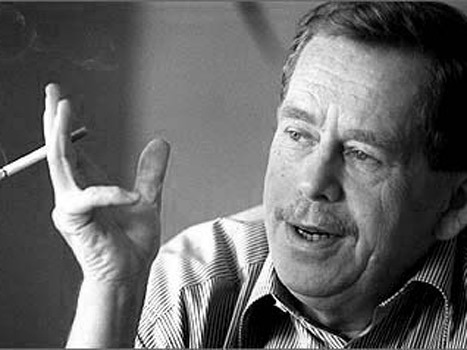Tributes pour in for Havel: 'soul of Czech revolution'
AFP
PRAGUE- Tributes poured in from around the world Sunday for late former Czech president Vaclav Havel, hailed as the "soul of the Czech revolution" and an icon for freedom and unity in Europe.
Havel -- a dissident and playwright who was the hero of the 1989 Velvet Revolution against communist rule and became his country's first post-independence president -- died Sunday aged 75.

US President Barack Obama praised the former political prisoner whose "peaceful resistance shook the foundations of an empire, exposed the emptiness of a repressive ideology, and proved that moral leadership is more powerful than any weapon".
"He played a seminal role in the Velvet Revolution that won his people their freedom and inspired generations to reach for self-determination and dignity in all parts of the world," Obama said in a statement.
"He also embodied the aspirations of half a continent that had been cut off by the Iron Curtain, and helped unleash tides of history that led to a united and democratic Europe," Obama added in his eulogy.
German Chancellor Angela Merkel, who grew up in communist East Germany, described Havel as a "great European".
"His fight for freedom and democracy was as unforgettable as his great humanity," she said. "We Germans in particular have much for which we are grateful to him."
Merkel’s Foreign Minister Guido Westerwelle said Havel was "the soul of the Czech revolution" who helped surmount Europe's Cold War division.
"Havel was a trailblazer for European reunification," he said of the man who led Czechoslovakia and its successor, the Czech Republic, from 1989 to 2003.
"Without him and his courageous words, the democratic awakening in Central and Eastern Europe would have been unthinkable," Westerwelle said.
Czechoslovakia played a pivotal role in the fall of the Berlin Wall.
In the late summer of 1989, thousands of East Germans hoping to flee to the West massed for weeks at the German embassy in Prague.
Germany's then foreign minister Hans-Dietrich Genscher told them they could come to West Germany -- a watershed moment in convincing communist East Germany it was futile to keep trapping its citizens.
When East Germany opened the border, it paved the way to German unification 11 months later and ushered in the end of the Cold War.
Poland's former president Lech Walesa, who like Havel went from dissident to head of state, called Havel "a great campaigner in the struggle for freedom, for democracy and liberation from the yoke of communism".
"His voice will be greatly missed in Europe, above all now when it is experiencing a great crisis," he said.
Romanian President Traian Basescu said Havel "was seen with admiration and hope by all those who wished the end of communism" in Europe.
"He will remain for us and for generations to come the incarnation of the European civic spirit."
Israeli Prime Minister Benjamin Netanyahu called Havel a "brave and strong voice against totalitarianism."
"He was a true friend of Israel and in recent years joined with other international leaders to defend Israel against attempts to delegitimise the one only Jewish state."
France's President Nicolas Sarkozy said the Czech Republic had "lost one of its great patriots, France a friend and Europe one of its wisest men."
British Prime Minister David Cameron said Europe owed Havel a "profound debt" for bringing freedom and democracy.
"For years, communism tried to crush him, and to extinguish his voice," Cameron said. "But Havel, the playwright and the dissident, could not be silenced."
Council of Europe Secretary General Thorbjoern Jagland said Havel had "always remained faithful to the values of a free and tolerant society".
"He did not only believe in these principles, he fought for them," Jagland said.
Lithuanian President Dalia Grybauskaite said "Havel inspired resistance in those who had no choice under totalitarianism."
"He gave meaning to the peaceful revolution in his country, and became an example for Lithuanian dissidents," she said.
European Commission chief Jose Manuel Barroso said "Vaclav Havel's name will remain forever attached to the reunification of Europe and the expansion of its values to Central and Eastern Europe."
Italian Prime Minister Mario Monti said Havel fought for democratic values that are "the basis of the European construct.
"The example of Vaclav Havel should be for all of us an encouragement to move forward in the name of those values that he embodied."
----------------------------------------------------------------------------------